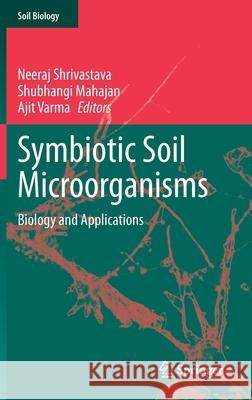Symbiotic Soil Microorganisms: Biology and Applications » książka



Symbiotic Soil Microorganisms: Biology and Applications
ISBN-13: 9783030519155 / Angielski / Twarda / 2020 / 489 str.
Symbiotic Soil Microorganisms: Biology and Applications
ISBN-13: 9783030519155 / Angielski / Twarda / 2020 / 489 str.
(netto: 691,70 VAT: 5%)
Najniższa cena z 30 dni: 693,97
ok. 16-18 dni roboczych.
Darmowa dostawa!
Dr. Neeraj Shrivastava is a Senior Assistant Professor at Amity University Uttar Pradesh, Noida India. He has 13 years of research and teaching experience in the field of Microbial Technology. Earlier, he was visiting Scientist and Post-doctoral researcher at Institute of Biotechnology, Zhejiang University, China. He was awarded fellowships from Chinese Scholarship Council (CSC), National Post-Doctoral Scholarship foundation China, and Senior Research Fellowship from CSIR, MHRD Govt. of India. He is also qualified ‘National Rural Talent Search Examination’ conducted by SCERT, MP State, Govt. of India.
Dr. Shrivastava focuses his research on proteomic and genomic approaches in the field of plant microbe interactions. He is also expertise in the field of biofilms and antimicrobial resistance. Dr. Shrivastava has published more than 38 research papers and book chapters in the peer-reviewed journals and reputed international publishers. He has delivered several talks at National and International conferences and also published abstracts and papers. Dr. Shrivastava has successfully guided 09 Ph.D. and 02 M.Phil. students during his tenure. He is an expert reviewer of various National and International journals.
Ms. Shubhangi Mahajan obtained her bachelor and master degree in biotechnology from Amity University Uttar Pradesh Noida India. Presently, she is research scientist at Amity Institute of Microbial Technology, Amity University Uttar Pradesh Noida, India. Her research interest is interaction of symbiotic fungus on Super Grain for Food Security and of great economic importance with special reference to Black rice and members of Gramineae family. She is also exploring the mechanism of the enhancement of fungal biomass by the interaction of Zinc nanomaterials. The focus of research is enhancement of plant biomass and the value addition to the plant in particular the antioxidants.
Ms. Sharma has published several research papers and review articles in internationally renowned journals. She has also filed two national patents. She has delivered several talks at various National platforms and also published abstracts in conferences and workshops. She is presently engaged in various internal research projects related to commercialization of novel fungus Piriformospora indica.
Prof. Dr. Ajit Varma is currently the Group Dy. Vice Chancellor, a Distinguished Scientist & Professor of Eminence, Amity Institute of Microbial Technology (Amity University Uttar Pradesh) & Vice Chairman, Amity Science, Technology & Innovation Foundation, Amity Campus, Noida, Uttar Pradesh, India. He was a visiting professor to many internationally reputed Universities. He has received more than 100 awards from several notable scientific bodies such as Commonwealth Fellowship (Australia), National Research Council (Canada), Alexander von-Humboldt Foundation (Germany), National Science Foundation (USA), Swiss Federal Research Fellowship (Switzerland), BP Koirala award (Nepal), DFG-INSA Fellowship (Indo-Germany), FAMI Award 2011 (India) and many more.
He has successful supervised over 109 Ph.D students and one D.Sc student. He has published over 450 research articles, which appeared in National and International, journals of repute and also several major review articles and chapters in books, published 114 books in the area of Microbial Technology, published by Academic Press, London, CRC Press, Florida, USA, IDRC, Canada and Springer-Verlag, Germany. Nominated as Editor-in-Chief by Springer-Verlag (Germany & New York), the leading science-publishing house, to prepare volumes on Soil Biology. Nominated as Editor-in-Chief by IK Internationals to make series of books on Microbial and Biotechnological Research, Academic Editor - ‘International Journal of Plant & Soil Science.
This book explores microbial symbiosis, with a particular focus on soil microorganisms, highlighting their application in enhancing plant growth and yield. It addresses various types of bacterial and fungal microbes associated with symbiotic phenomena, including rhizobium symbiosis, arbuscular mycorrhizal symbiosis, ectomycorrhizal symbiosis, algal/lichen symbiosis, and Archeal symbiosis.
Presenting strategies for employing a diverse range of bacterial and fungal symbioses in nutrient fortification, adaptation of plants in contaminated soils, and mitigating pathogenesis, it investigates ways of integrating diverse approaches to increase crop production under the current conventional agroecosystem.
Providing insights into microbial symbioses and the challenges of adopting a plant-microbe synergistic approach towards plant health, this book is a valuable resource for researchers, graduate students and anyone in industry working on bio-fertilizers and their agricultural applications.
1997-2026 DolnySlask.com Agencja Internetowa
KrainaKsiazek.PL - Księgarnia Internetowa









